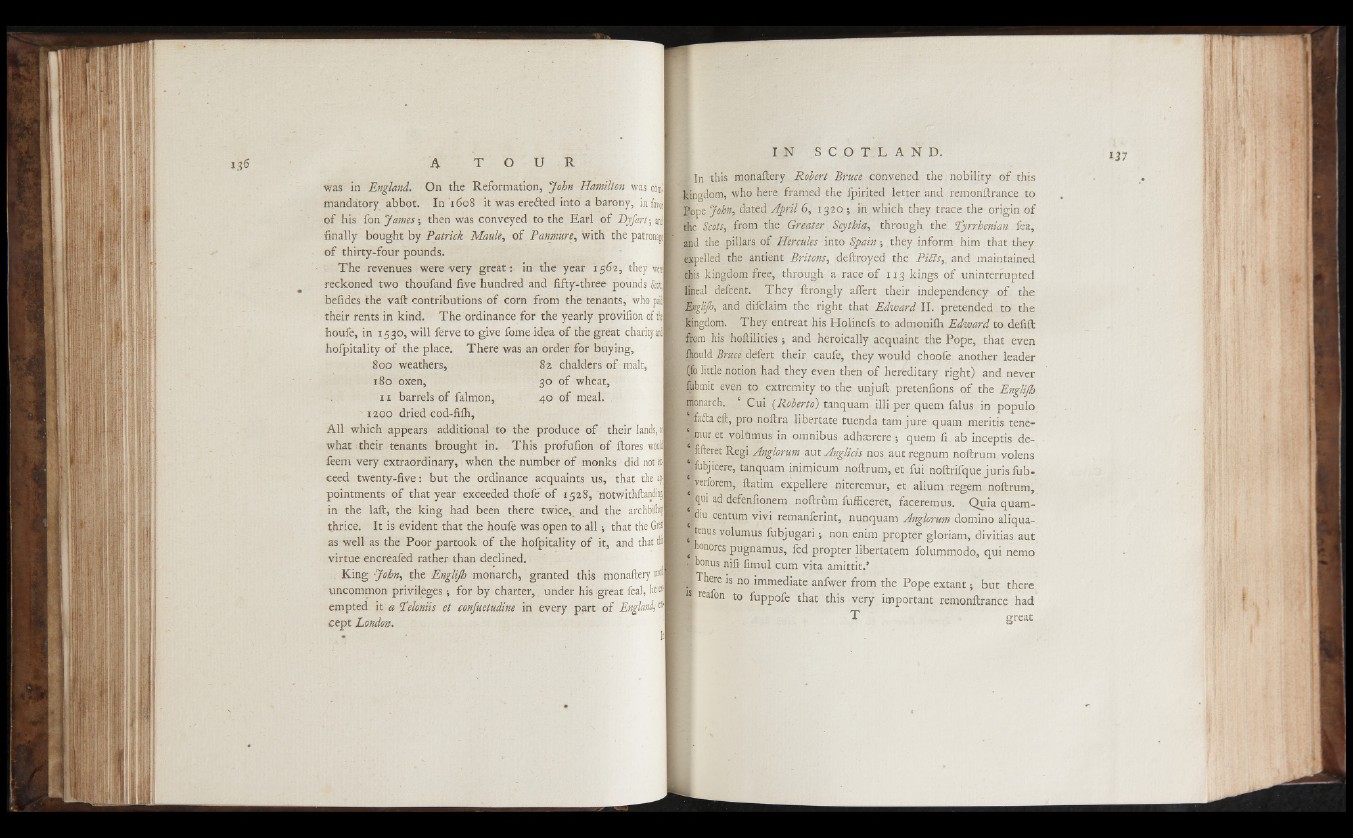
was in England. On the Reformation, 'John Hamilton was cimi
mandatory abbot. In 1608 it was erefted into a barony, in favot:
of his fon James; then was conveyed to the Earl of Dyfarl; and
finally bought by Patrick Maule, of Panmure, with the patroiw
of thirty-four pounds.
The revenues were very great: in the year 1562, they wen
reckoned two thoufand five hundred and fifty-three pounds Stsli,
befides the vaft contributions of corn from the tenants, who pi
their rents in kind. The ordinance for the yearly provifion of A
houfe, in 1530, will ferve to give fome idea of the great charity id
hofpitality of the place.. There was an order for buying,
800 weathers, 82 chalders of malt,
180 oxen, 30 of wheat,
11 barrels of lalmon, 40 of meal,
p 1200 dried cod-fiih,
All which appears additional to the produce of their lands, i
what their tenants brought in. This profufion of ftores would
feem very extraordinary, when the number of monks did not ei
ceed twenty-five: but the ordinance acquaints us, that the ap
pointments of that year exceeded thofe' of 1528, n o tw ith fta n d iif
in the laft, the king had been there twice, and the archbilhop
thrice. It is evident that the houfe was open to a ll; that the Gill
as well as the Poor partook of the hofpitality of it, and that tM
virtue encreafed rather than declined.
King John, the Englijh monarch, granted this monaftery
uncommon privileges ; for by charter,, under his great feal, he®
empted. it a J'eloniis et confuetudine in every part of England,®
cept London.
■ In this monaftery Robert Bruce convened the nobility of this
kingdom, who here framed the fpirited letter and remoriftrance to
gppe John, dated April 6, 1320 ; in which they trace the origin of
the Scots, from the Greater Stythia, through the. Tyrrhenian fea,
ahd the pillars of Hercules into Spain; they inform him that they
expelled the antient Britons, deftroyed the Piils^ and maintained
this kingdom free, through a race of 113 kings of uninterrupted
ljbeal defcent. They ftrongly afiert their independency of the
inglijh, and difclaim the right that Edward II. pretended to the
kingdom. They entreat his Holinefs to admonilh Edward to defift
pom his hoftilities ; and heroically acquaint the Pope, that even
lhould Bruce defiert their caufe, they would choofe another leader
(fo little notion had they even then of hereditary right) and never
liibmit even to extremity to the unjuft pretenfions of the Englijh
monarch. ‘ Cui (Roberto) tanquam illi per quern falus in populo
■ fafta eft, pro noftra libertate tuenda tarn jure quam meritis tene-
Hmur et voliimus in omnibus adhaerere; quem fi ab inceptis de-
■fifteret Regi Anglorum zest Angiitis nos aut regnum noftrum volens
Bfubjicere, tanquam ininficum noftrum, et fui noftrifque juris fub-
B'erforem, ftatim expellere niteremur, et alium regem noftrum,
Kqui ad defenfionem noftrum fufficeret, faceremus. Qitia quam-
^ diti centum vivi remanferint, nunquam Anglorum domino aliqua-
Itenus volumus fubjugari; non enim propter gloriam, divitias aut
fhonores pugnamus, fed propter libertatem folummodo, qui nemo
^B>onus nifi fimul cum vita amittit.’
^■There is no immediate anfwer from the Pope extant 5 but there
■ reafon t0 fuppofe that this very important remonftrance had
T great